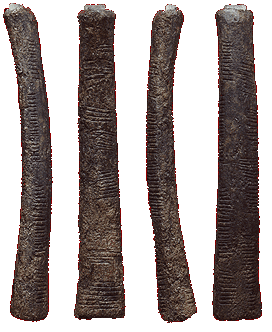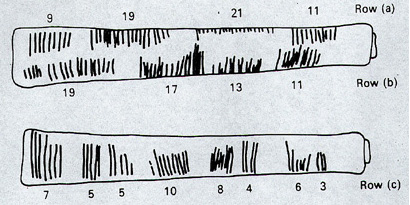Yeah, my final year of college I took a class called "Popular Music in America" and almost every popular music genre in this country is at least rooted from black culture if not outright stolen.
Like your teacher, my professor (also white) was ashamed, disgusted, and embarrassed. I mean how could he not be? Every unit we ended up discussing how whatever genre we were studying at the time came from the black community and ended up getting appropriated by mainstream (white) society with the black originators getting ZERO credit. White people are a joke and even they know that they're a joke.
I'm also not convinced that a lot of these so called "inventions" that white inventors/scientists have "invented" or "discovered" were actually created by them. If whites can so easily steal and take credit for musical genres, god only knows what all they haven't taken credit for throughout history. Have they actually invented anything on their own? Or do they just steal everything and take credit for it?
We can start with math and physics from Africa, Astronomy and even Astrology..heck, we may have to list these things.
Africans got the first calculator..
https://en.wikipedia.org/wiki/Ishango_bone
http://www.math.buffalo.edu/mad/Ancient-Africa/ishango.html
Most histories of mathematics devote only a few pages to Ancient Egypt and to northern Africa during the 'Middle Ages´. Generally they ignore the history of mathematics in Africa south of the Sahara and give the impression that this history either did not exist or, at least, is not knowable, traceable, or, stronger still, that there was no mathematics at all south of the Sahara. In history, to Europeans, even the Africanity of Egyptian mathematics is often denied or suffers eurocentric views of conceptions of both 'history' and of 'mathematics' form the basis of such views.
High in the mountains of Central Equatorial Africa, on the borders of Uganda and Zaire lies
Lake Edward, a source of the Nile. It is a small lake (about 30 miles by 60 miles).

click map to download an
expanded view
Though the area is sparsely populated today, approximately 25,000 (update from 9,000) years ago by the shores of the lake lived a small community that fished, gathered, and grew crops The settlement only existed a few hundred years before being buried in a volcanic eruption. The place where their remains were found (1960) has a name now given to these people - Ishango. Among their remains is
the second oldest mathematical object (the oldest is
here) in Africa.
Some say that the
Ishango Bone is the oldest table of prime numbers. Marshack later concluded, on the basis of his microscopic examination, that it represented a six-month lunar calendar.
prime numbers or menstral calendar
Egyptian multiplication. Recent studies with microscopes illustrate more markings and it is now understood the bone is also a lunar phase counter. Who but a woman keeping track of her cycles would need a lunar calendar? Were women our first mathematicians?
Ishango Bone Exhibition
Space Odessy of the Ishango bone
Ishango Operation in Brussels
BACK TO The Ancients in Africa
The following dating information was sent by email from Professor Charles Finch:
The site where the Ishango Bone was found was re-dated by Alison Brooks more than a dozen years ago and found to be 25,000 years old rather than the original estimate of 8,500 years. However, the Lembombo Bone in Swaziland is still 10,000 years older, consistent with iron ore mining there going back 43,000 years ago. Proto-mathematics begins in Paleolithic Central and Southern Africa.
references:
- Shreeve, "The Dating Game," Discover, September 1992, pp. 76-83.
- Alison Brooks, "Dating and Contex of Three Middle Stone Age Sites with Bone Points in the Upper Semliki Valley, Zaire," Science, 4/28/95, pp. 548-52.
references for this web page:
- AMUCHMA-NEWSLETTER-9: http://www.math.buffalo.edu/mad/AMU/amu_chma_09.html
- J. de Heinzelin, Ishango, Scientific American, 206:6 (June 1962) 105--116.
- J. Shurkin, Engines of the mind: a history of the computer, W. W. Norton & Co., 1984., p21
- J. Bogoshi, K. Naidoo and J. Webb, The oldest mathematical artifact, Math. Gazette, 71:458 (1987) 294.
- Claudia Zaslavsky, Women as the First Mathematicians, the Women in Mathematics Education Newsletter,Volume 7 Number 1, January 1992.
Since opening 5/25/97,
visitors to
The web pages
MATHEMATICIANS OF THE AFRICAN DIASPORA
are brought to you by
The Mathematics Department of
The State University of New York at Buffalo.
They are created and maintained by
Scott W. Williams
Professor of Mathematics
CONTACT Dr. Williams
 "
"
 at the bolded, have you even read my comments in this thread, if you had you would have noticed me specifically acknowledging that as s phenomenon throughout history and today or are you such a baby that anything remotely balanced comes off as being a white apologist?
at the bolded, have you even read my comments in this thread, if you had you would have noticed me specifically acknowledging that as s phenomenon throughout history and today or are you such a baby that anything remotely balanced comes off as being a white apologist?
 at the same time.
at the same time.









